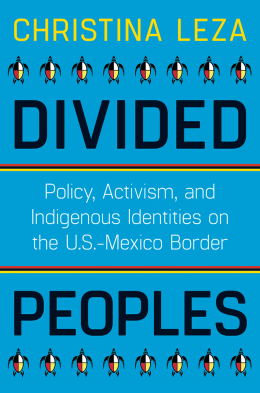
The border region of the Sonoran Desert, which spans southern Arizona in the United States and northern Sonora, Mexico, has attracted national and international attention. But what is less discussed in national discourses is the impact of current border policies on the Native peoples of the region. "Divided Peoples: Policy, Activism, and Indigenous Identities on the U.S.-Mexico Border," recently published by Christina Leza, associate professor and chair of the Anthropology Department, does just that.
Leza, a linguistic anthropologist and Yoeme-Chicana activist scholar, notes that there are 26 tribal nations recognized by the U.S. federal government in the southern border region and approximately eight groups of Indigenous peoples in the United States with historical ties to Mexico: the Yaqui, the O'odham, the Cocopah, the Kumeyaay, the Pai, the Apaches, the Tiwa (Tigua), and the Kickapoo.
Leza addresses the impact border policies have on traditional lands and the peoples who live there - whether environmental degradation, border patrol harassment, or the disruption of traditional ceremonies.
She also shows how such policies affect the traditional cultural survival of Indigenous peoples along the border and examines local interpretations and uses of international rights tools by Native activists, counterdiscourse on the U.S.-Mexico border, and challenges faced by Indigenous border activists when communicating their issues to a broader public.
Through ethnographic research with grassroots Indigenous activists in the region, Leza reveals several layers of division - the division of Indigenous peoples by the physical U.S.-Mexico border, the divisions that exist between Indigenous perspectives and mainstream U.S. perspectives regarding the border, and the traditionalist/nontraditionalist split among Indigenous nations within the United States.
In the article "For Native Americans, US-Mexico Border is an 'Imaginary Line'," published this spring in The Conversation, Leza writes that Native Americans interviewed by her describe the U.S.-Mexico border as "the imaginary line" - an invisible boundary created by colonial powers that claim sovereign indigenous territories as their own.
Leza, who holds a Ph.D. from the University of Arizona, joined Colorado College's Department of Anthropology in 2011. Her research addresses Indigenous peoples, racial and ethnic discourses, grassroots activism, Indigenous rights, cognitive anthropology, and the U.S.-Mexico border. A native Arizonan with strong ties to both the El Paso-Ciudad Juárez and the Tucson-Nogales border regions, her publications include work on U.S.-Mexico border hip hop as identity and social movement discourse and indigenous activist discourses.
"Divided Peoples," published by the University of Arizona Press, asks the reader to consider the possibilities for challenging settler colonialism both in sociopolitical movements and in scholarship about Indigenous peoples and lands.





